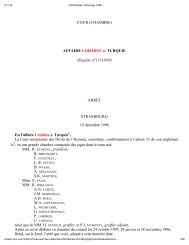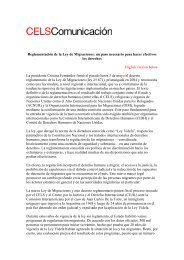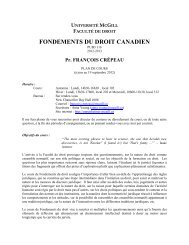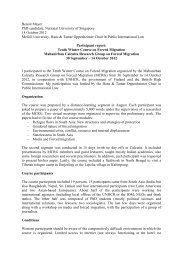Preventive Detention, Suspected Terrorists, and War
Preventive Detention, Suspected Terrorists, and War
Preventive Detention, Suspected Terrorists, and War
Create successful ePaper yourself
Turn your PDF publications into a flip-book with our unique Google optimized e-Paper software.
COLE FINAL<br />
7/1/2009 12:43 AM<br />
738 CALIFORNIA LAW REVIEW [Vol. 97:693<br />
administration’s <strong>and</strong> the Obama administration’s. Neither Wilkinson nor the<br />
Israeli Supreme Court would permit detention of mere supporters of an enemy<br />
organization, much less detention of members or supporters of associated<br />
groups. And neither Judge Wilkinson nor the Israeli Supreme Court would<br />
permit detention based on membership alone. They both require some evidence<br />
of involvement in hostilities. This may seem odd, because under traditional<br />
laws of war, any member of the opposition armed forces may be detained,<br />
without any need to show that he has planned or engaged in harmful conduct,<br />
or contributed to the cycle of hostilities. Why do both the Israeli Supreme Court<br />
<strong>and</strong> Judge Wilkinson require more than membership<br />
The answer, I believe, lies in the difference between membership in a<br />
terrorist organization <strong>and</strong> being enlisted in an army. A terrorist organization is a<br />
political organization, not a military force. It may well have a military wing,<br />
but many “terrorist organizations” are multipurpose groups, <strong>and</strong> include<br />
members who never engage in violence. Hezbollah, for example, is a political<br />
organization with representation in the Lebanese national legislature. 206 Mere<br />
membership in such an organization should not be a ground for military<br />
detention, <strong>and</strong> under the Israeli law, it is not. Just as military detention would<br />
not be permissible simply because an individual was part of the German civil<br />
service, military detention should not be permitted simply because an<br />
individual is a member of a terrorist organization. A scheme of military<br />
detention predicated on the need to incapacitate the enemy’s combatants<br />
requires proof of more than mere membership in a “terrorist organization”; it<br />
requires proof of contribution to hostilities.<br />
At the same time, membership in a terrorist organization will often be<br />
more difficult to prove than membership in a fighting army. Terrorist<br />
organizations tend to operate cl<strong>and</strong>estinely <strong>and</strong> members often disguise<br />
themselves among the general population. Thus, proof of formal membership—<br />
a prerequisite for detention under Judge Wilkinson’s definition, although not<br />
under the Israeli law—may be too high an evidentiary burden in some<br />
instances. Where the state can demonstrate that an individual directly<br />
participated in hostilities against the state <strong>and</strong> on behalf of the enemy, military<br />
detention may be justified even if the state cannot prove actual membership in<br />
the organization with which it is at war. In a traditional conflict, mercenaries<br />
<strong>and</strong> irregular forces may be detained, even if they are not members of the<br />
armed forces of the enemy or nationals of the enemy state. 207 So, too, an<br />
individual who is directly engaged in hostilities against the United States on<br />
206. Thanassis Cambanis, Lebanese Presidential Selection Delayed by Deadlock, N.Y.<br />
Times, Sept. 26, 2007, at A8.<br />
207. Civilians who actively participate in hostilities lose their status as protected civilians<br />
under the Geneva Conventions. Geneva Convention, supra note 29, at art. 3(1); Claude Pilloud<br />
et al., Commentary on the Additional Protocols of 8 June 1977 to the Geneva<br />
Conventions of 12 August 1949 618 (1987).

















